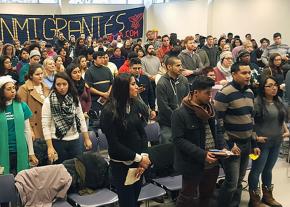A conference to build pro-immigrant power
reports from Boston on a National Assembly held by Movimiento Cosecha, which included a call to make May 1 a massive "Day Without Immigrants."
SOME 350 immigrant workers, students, organizers and supporters from 25 states gathered for a weekend in early February in Cambridge, Massachusetts, for a National Assembly organized by Movimiento Cosecha.
Cosecha describes itself as "a nonviolent movement working to win permanent protection, dignity and respect for the 11 million undocumented people in this country."
The purpose of the assembly--which consisted of presentations by Cosecha organizers, as well as breakout sessions, discussion and actions around Boston--was to prepare the organization's membership and supporters for "a year of resistance," which was laid out in four steps:
1. Building support, by recruiting and training activists and organizers across the country.
2. Political intervention, by reaching out to elected officials and presenting an ultimatum to political parties from the communities they represent.
3. Economic non-cooperation (i.e., boycotting businesses).
4. A national Day Without Immigrants on May 1.
THE FACT that an organization like Cosecha is gaining momentum and attention is not surprising following Donald Trump's election and in the face of the escalating attacks on working people, especially the undocumented,

Two weeks before their National Assembly, Cosecha organized a protest at Boston's Logan International Airport in support of Muslims who had been detained under Trump's travel ban. In a matter of hours, several hundred people were in the airport terminal-- part of an enormous nationwide protest in solidarity with Muslims.
Immediately after Trump's election, Cosecha spearheaded the call taken up by students around the country that their campuses be declared "sanctuaries" for immigrants. There have been numerous protests demanding that university administrators refuse to cooperate with federal, state or local authorities targeting immigrant students or their families.
This militant response is very different from the behavior of Democratic Party leaders who talked about "working" with Trump. Speaking at the Assembly, an organizer named Carlos had this to say about the Democrats:
Cosecha is a nonpartisan movement. We have experienced record deportations under the Obama administration and we do not consider the Democratic Party a friend to the immigrant community.
In 2008 and in 2012, immigrant communities carried Obama to the finish line in most competitive states, yet the Obama administration never prioritized their promises around immigration reform, instead millions of undocumented families were criminalized and separated and Obama created a deportation machine which now Trump is expanding on to continue separating our families.
Indeed, Barack Obama deported more immigrants than any other president in U.S. history, and top Democrats such as Hillary Clinton supported the construction of a barrier on the U.S./Mexico border since the later years of George W. Bush's presidency.
CLEARLY THE most ambitious part of Cosecha's strategy for 2017 is the call for a Day Without Immigrants on May 1.
Cosecha takes its inspiration from the original "Day Without Immigrants" in 2006, when immigrants across the country rose up to resist a Republican proposal to criminalize all 12 million undocumented people.
As NBC News reported of the May 1 action that year: "More than 1 million mostly Hispanic immigrants and their supporters skipped work and took to the streets [across the country], flexing their economic muscle in a nationwide boycott that succeeded in slowing or shutting many farms, factories, markets and restaurants."
The 2006 action was deliberately called to coincide with International Workers' Day, and the same is true this year. "May Day is a symbolic day for immigrants and workers in the U.S. and around the world," said Carlos. "Cosecha believes our biggest source of power is our labor. This is why highlighting International Workers' Day is key for us."
As the Trump era begins and coordinated ruling-class attacks on working people intensify, solidarity and struggle from below have become crucial tools for workers, especially immigrants, to defend themselves and fight back against repression.
Cosecha's plan to organize mass resistance in the style of 2006's immigrant mega-marches comes at a time when a united workers' movement is badly needed. It shows an understanding of the power of the working class to fundamentally change society. And Cosecha's organizing of the airport protest in support of Muslims shows a commitment to solidarity between oppressed people that will be urgently needed.
A movement to fight for the rights of undocumented people is beginning to take shape in the months following Trump's election. Everyone who wants to oppose Trump and his administration needs to support this movement and work to strengthen a general commitment to solidarity and struggle.


